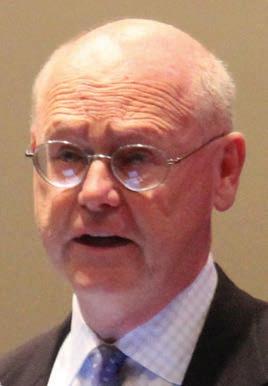How Fibber MCgee & Molly
WON WORLD WAR II It’s December 9, 1941. It’s Radio. It’s Live. There is a studio audience. The United States has just gone to war. One can only try to imagine the atmosphere in the studio only two days after the surprise attack on Pearl Harbor. The
T
By Mickey Smith
he broadcast began with the announcement: “NBC will be on the air with the latest war news at the beginning of every program day and night. We thank the sponsor of this program for relinquishing its time in order to bring you the latest news from the NBC Newsroom.” It was up to the announcer Harlow Wilcox to open on a seemingly ordinary note. But not for long. “We have just received this message for our listeners,” he said, “in a telegram from the president of S.C. Johnson and Son, Inc., our sponsor: ‘In these serious days, there can be no division of opinion. The United States is at war. We are all ready and eager to do our part. The makers of Johnson’s Wax® and GloCoat® believe it is in the public interest to continue programs as entertaining as “Fibber McGee and Molly.” They have a place in national morale. So you can continue to hear “Fibber McGee and Molly” and still be in touch with latest developments. We have asked the National Broadcasting Co. to feel free at any time to cut into our programs with important news flashes and announcements,’ signed, H.F. Johnson, Jr.” There was no reference to the war in the program proper. There just hadn’t been time to work in war messages, especially in a way, later perfected, that did not interfere inordinately with the flow of humor. But the show closed with a moving rendition of “My Country ‘Tis of Thee” sung by that live studio audience. This was the beginning of a remarkably successful effort to combine absolutely first-class entertainment with public service.
40 MEEK SCHOOL
show had already been written! Indeed, the finishing touches would have been put on the script on the very day Pearl Harbor was bombed. Uncertainty and apprehension must have been rampant, but the show went on.
The format of the show was simple. Most of the action took place in the Magee’s home at 79 Wistful Vista. A series of visitors would come through the front door, and engage in often hilarious banter. The famous “Closet,” a triumph of sound effects, was chaotically opened hundreds of times and became a part of America’s folklore. The show aired on Tuesday nights, and on more than one occasion President Roosevelt is said to have scheduled a speech to follow because he knew he would have a ready-made audience. Such was its popularity.
THE SHOW AND THE WAR
“Fibber McGee and Molly” remained on the air from 1935 to 1956. In the period between Pearl Harbor and the official V-J Day of Sept. 2, 1945, it aired 139 times. (There was a summer hiatus.) Of those 139 shows, at least 28 had a theme directly related to the war or contained special material on the subject (e.g., gas rationing). In addition to full theme shows, virtually every show contained one or more of the following: Remarks by Fibber and/or Molly, usually the latter, worked into the story context. Remarks by the Jordans (as themselves) directly asking the listeners to do something specific (e.g., buy War Bonds, limit travel, conserve sugar). Similar remarks by other cast members. Patriotic musical selections. Messages from the sponsor, Johnson’s Wax®. During the war years, the show received Hooper ratings of either first or second each year. Throughout the war the message was clear. America was at war, the enemy clearly identified, and those on
the home front had obligations. American men and women were dying for their country. They deserved the support of those at home who, in turn, must do their best to support the war effort. During the war, full shows were devoted, always with humor, to such subjects as: The need for rationing: sugar, gasoline, cigarettes, rubber; Buying War Bonds; The role played by the Women’s Army Corp., Merchant Marines, and Coast Guard; European war refugees; Turning in unused scrap; Women working in men’s jobs on the home front; and many more.
THE PLAYERS
Jim and Marian Jordan were Fibber McGee and Molly. Fibber, though fiercely patriotic, generally believed that wartime restrictions were meant for the “other guy.” Molly was ever the voice of reason and ultimately prevailed. She dampened Fibber’s misguided attempts at humor with the remarks which became a part of the American lexicon: “‘taint funny Magee.”
HARLOW WILCOX Harlow Wilcox was played by Harlow Wilcox. Like a few other announcers, such as Don Wilson on “The Jack Benny Show,” he not only sold Johnson’s Wax® products, but was a regular character in the program stories. The Johnson Co. allowed his mid-program appearances to become humorous battles between him trying to get in his pitch and the McGees trying to disrupt these efforts. Wilcox’s efforts, blessed by the sponsor, delivered


















